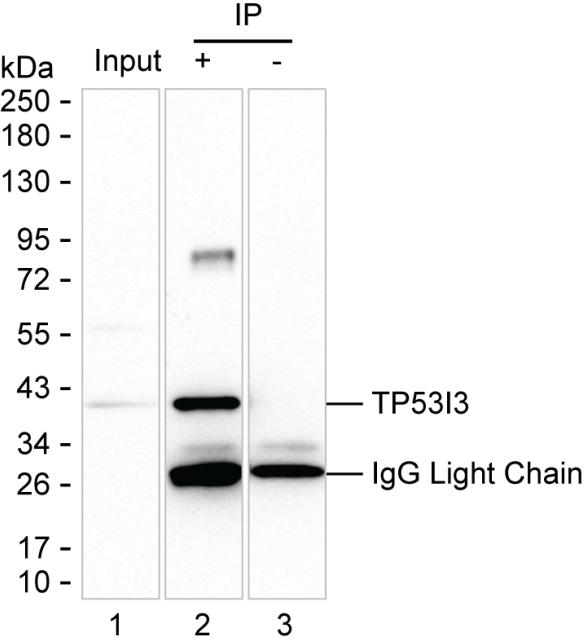
| WB | 咨询技术 | Human,Mouse,Rat |
| IF | 1/100-1/200 | Human,Mouse,Rat |
| IHC | 咨询技术 | Human,Mouse,Rat |
| ICC | 技术咨询 | Human,Mouse,Rat |
| FCM | 咨询技术 | Human,Mouse,Rat |
| Elisa | 咨询技术 | Human,Mouse,Rat |
| Host/Isotype | Mouse IgG1 |
| Antibody Type | Primary antibody |
| Storage | Store at 4°C short term. Aliquot and store at -20°C long term. Avoid freeze/thaw cycles. |
| Species Reactivity | Human |
| Immunogen | Purified recombinant fragment of human TP53I3 |
| Formulation | Purified antibody in PBS with 0.05% sodium azide |
+ +
以下是关于TP53I3抗体的3篇参考文献,按文献名称、作者及摘要内容概括列出:
---
1. **文献名称**:*"TP53I3 is a target of HIF-1 and mediates apoptosis under hypoxic conditions"*
**作者**:Li Y, et al.
**摘要**:该研究利用特异性TP53I3抗体验证其在缺氧条件下的表达变化,发现HIF-1通过调控TP53I3诱导细胞凋亡,抗体在Western blot和免疫荧光中表现出高特异性。
2. **文献名称**:*"Characterization of TP53I3 as a redox-sensitive protein in oxidative stress responses"*
**作者**:Wang H, et al.
**摘要**:通过TP53I3抗体检测其在氧化应激模型中的表达与定位,证实TP53I3在清除ROS中起关键作用,抗体适用于免疫组化及流式细胞术。
3. **文献名称**:*"TP53I3 suppresses tumor progression by enhancing p53 stability in colorectal cancer"*
**作者**:Chen L, et al.
**摘要**:研究使用TP53I3抗体分析结直肠癌组织样本,发现其高表达与p53蛋白稳定性正相关,抗体在IHC和Co-IP实验中验证了TP53I3与p53的相互作用。
---
以上文献均聚焦于TP53I3的功能研究,并通过抗体实验验证其在疾病机制中的作用。如需具体DOI或发表年份,可进一步补充。
The TP53I3 (Tumor Protein p53 Inducible Protein 3) antibody is a research tool used to detect and study the TP53I3 protein, which is encoded by the TP53I3 gene. This gene, also known as P53CSV or PIG3. is a transcriptional target of the tumor suppressor protein p53. activated in response to cellular stress such as DNA damage or oxidative stress. TP53I3 plays a role in regulating reactive oxygen species (ROS) levels and apoptosis, contributing to p53-mediated tumor suppression. Dysregulation of TP53I3 has been implicated in cancer progression, chemoresistance, and other pathologies linked to oxidative stress.
The TP53I3 antibody is widely utilized in techniques like Western blotting, immunohistochemistry (IHC), and immunofluorescence (IF) to analyze protein expression, localization, and dynamics in cell lines, tissues, or clinical samples. Researchers employ it to investigate TP53I3's involvement in p53 signaling pathways, its interaction with other stress-response proteins, and its potential as a biomarker or therapeutic target in cancers, neurodegenerative diseases, or aging-related conditions. Validation of TP53I3 antibodies typically includes specificity checks using knockout controls and cross-reactivity assessments. Its applications span basic research on oxidative stress mechanisms, drug discovery, and clinical studies exploring TP53I3's prognostic or diagnostic value.
×